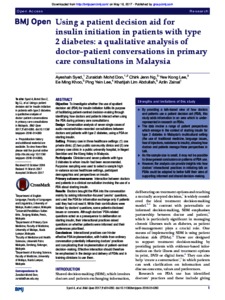Citation
Syed, Ayeshah and Don, Zuraidah Mohd and Chirk, Jenn Ng and Yew, Kong Lee and Ee, Ming Khoo and Ping, Yein Lee and Abdullah, Khatijah Lim and Zainal, Azlin
(2017)
Using a patient decision aid for insulin initiation in patients with type 2 diabetes: a qualitative analysis of doctor?patient conversations in primary care consultations in Malaysia.
BMJ Open, 7 (5).
pp. 1-11.
ISSN 2044-6055
Abstract
Objective: To investigate whether the use of apatient decision aid (PDA) for insulin initiation fulfils its purpose of facilitating patient-centred decision-making through identifying how doctors and patients interact when using the PDA during primary care consultations.
Design: Conversation analysis of seven single cases of audio-recorded/video-recorded consultations between doctors and patients with type 2 diabetes, using a PDA on starting insulin.
Setting: Primary care in three healthcare settings: (1) one private clinic; (2) two public community clinics and (3) one primary care clinic in a public university hospital, in Negeri Sembilan and the Klang Valley in Malaysia.
Participants: Clinicians and seven patients with type 2 diabetes to whom insulin had been recommended. Purposive sampling was used to select a sample high in variance across healthcare settings, participant demographics and perspectives on insulin.
Primary outcome measures: Interaction between doctors and patients in a clinical consultation involving the use of a PDA about starting insulin.
Results: Doctors brought the PDA into the conversation mainly by asking information-focused ‘yes/no’ questions, and used the PDA for information exchange only if patients said they had not read it. While their contributions were limited by doctors’ questions, some patients disclosed issues or concerns. Although doctors’ PDA-related questions acted as a presequence to deliberation on starting insulin, their interactional practices raised questions on whether patients were informed and their preferences prioritised.
Conclusions: Interactional practices can hinder effective PDA implementation, with habits from ordinary conversation potentially influencing doctors’ practices and complicating their implementation of patient-centred decision-making. Effective interaction should therefore be emphasised in the design and delivery of PDAs and in training clinicians to use them.
Download File
![[img]](http://psasir.upm.edu.my/63657/1.hassmallThumbnailVersion/Using%20a%20patient%20decision%20aid%20for%20insulin%20initiation%20in%20patients%20with%20type%202%20diabetes%20a%20qualitative%20analysis%20of%20doctor.pdf)  Preview |
|
Text (Abstract)
Using a patient decision aid for insulin initiation in patients with type 2 diabetes a qualitative analysis of doctor.pdf
Download (2MB)
| Preview
|
|
Additional Metadata
Actions (login required)
 |
View Item |

